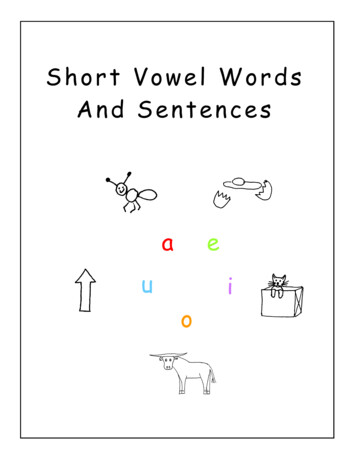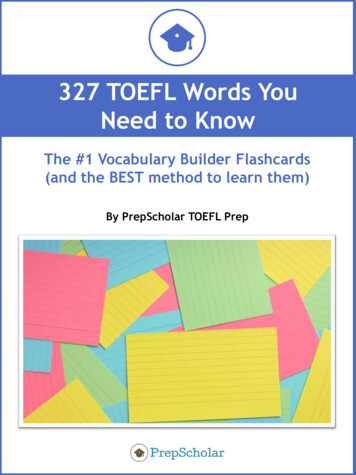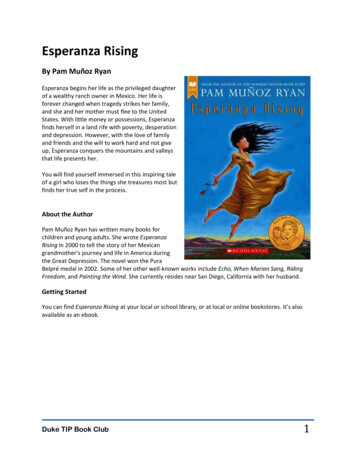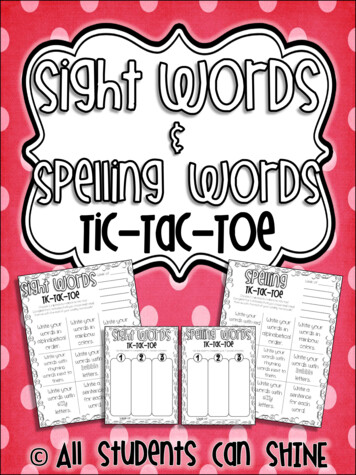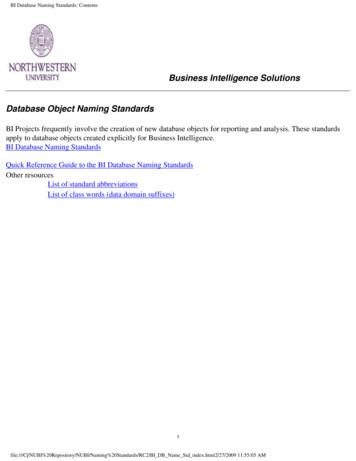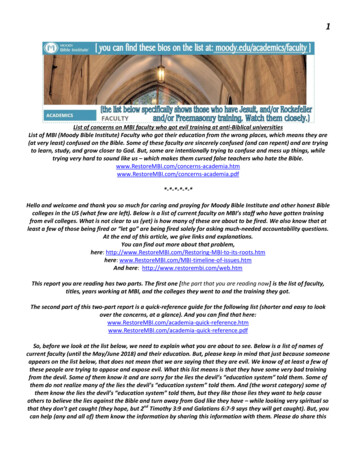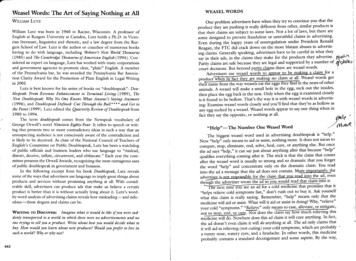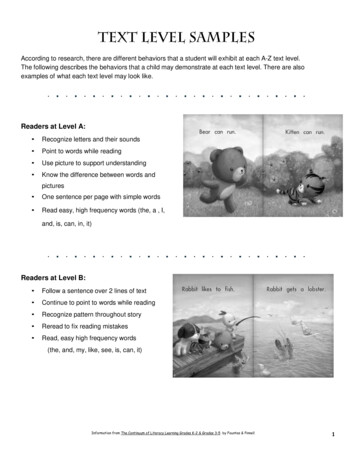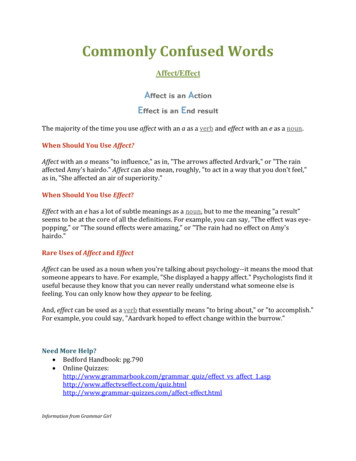
Transcription
Commonly Confused WordsAffect/EffectAffect is an ActionEffect is an End resultThe majority of the time you use affect with an a as a verb and effect with an e as a noun.When Should You Use Affect?Affect with an a means "to influence," as in, "The arrows affected Ardvark," or "The rainaffected Amy's hairdo." Affect can also mean, roughly, "to act in a way that you don't feel,"as in, "She affected an air of superiority."When Should You Use Effect?Effect with an e has a lot of subtle meanings as a noun, but to me the meaning "a result"seems to be at the core of all the definitions. For example, you can say, "The effect was eyepopping," or "The sound effects were amazing," or "The rain had no effect on Amy'shairdo."Rare Uses of Affect and EffectAffect can be used as a noun when you're talking about psychology--it means the mood thatsomeone appears to have. For example, "She displayed a happy affect." Psychologists find ituseful because they know that you can never really understand what someone else isfeeling. You can only know how they appear to be feeling.And, effect can be used as a verb that essentially means "to bring about," or "to accomplish."For example, you could say, "Aardvark hoped to effect change within the burrow."Need More Help? Bedford Handbook: pg.790 Online Quizzes:http://www.grammarbook.com/grammar quiz/effect vs affect tion from Grammar Girl
Among/BetweenUse between when you are talking about distinct, individual items, even if there are morethan two of them.Example: He chose between St. John’s, St. Thomas, and the University of Minnesota.Use among when you are talking about things that aren’t distinct items.Example: He chose among the colleges in Minnesota.Incorrect:Correct:1. The girl chose among an apple and an orange.1. The girl chose between an apple and an orange.2. The student needed to choose between theclasses offered by his college.2. The student needed to choose among theclasses offered by his college.Also remember that among and between convey different ideas about location. Johnwalked among the people conveys the idea that John was walking through a large crowd.John walked between the people conveys the idea that John walked between two people orwalked on some kind of pathway between two groups of people.Need More Help? Online /among vice/learningenglish/radio/specials/1723 rldservice/learningenglish/radio/specials/1723 z
Amount vs. NumberDefinition Amount: The total of two or more quantities (FreeDictionary.com).Number: A concept of quantity that is or can be derived from a single unit, the sumof a collection of units, or zero (FreeDictionary.com)RulesUse “amount” with quantities that cannot be counted. Use “number” with those that can.Examples1. I have a number of assignments to do this weekend.2. The amount of pollution in the air is impossible to know without scientifictechnology.3. There are a fair number of students in the class.4. What amount of sugar do I need to make chocolate chip cookies?Need More Help? Bedford: pg. -asked-questionsOnline ?title /watch?v F8Do9bDfd1Y
Less/FewerFewer is the comparative used to describe plural, discretelyquantifiable nouns, while less is the comparatives used whenspeaking of a grammatically singular noun (including massnouns).Fewer vs. Less (Simplified)Fewer is used when referring to things that can becounted.Less is used when referring to uncountable and usuallyabstract nouns.Use “fewer” with countable, individual things, and “less” withuncountable amounts, volumes, etc. So: “I should drink less coffee,” but “I should eat fewerdoughnuts.”But it’s not as simple as plural (fewer) vs. singular (less). Sometimes “less” is correct evenwith a plural noun. For example, the expression less than is used in front of a plural nounthat denotes a measure of distance, amount, or time.Example: We will go on vacation in less than four weeks.Example: She owes him less than 30.Example: We had less than 25 miles to go but ran out of gas.Also, use less with the expression or less.Example: Write a paragraph about an environmental issue in 200 words or less.CorrectEx. There were fewer customers than anticipated.Ex. I have less patience than Ted.IncorrectEx. There are less computers available in the lab today.Ex. In fewer than three weeks, she will be leaving for Europe.Need More Help? Online lhttp://www.towson.edu/ows/indexexercises.htm -- scroll down to header“Commonly Confused Words”There is conflicting information on this rule when applied to the phrase “10 items or less. In some instances, the rule statesthat the phrase should state “10 items or fewer” but in other cases the rule said this phrase had become idomatic and is anexception.
Loan/BorrowDefinition/explanation of the term:Borrow means “to take,” while lend and loan mean “to give.”Rules:You can only borrow something from someone. Try substituting "take" for borrow and"give" for lend or loan - the correct word will immediately be clear.Examples of incorrect vs. correct usage:CorrectEx. Loan (or lend) me a pen.Ex. May I borrow your book to study?IncorrectEx. Borrow me a pen.Ex. I can't afford to borrow you any money.Need More Help? Online Quizzes:http://a4esl.org/q/h/vm/cloze3.html
Than/ThenThan is a conjunction used in comparisons; then is an adverb denoting time (Bedford pg.802).Use than when you are comparing something to something else. Use then when you aretalking about when something happened.Incorrect:Correct:1. I am better at math then Jenny.1. I am better at math than Jenny.2. I went to the store and than went home.2. I went to the store and then went home.Need More Help? Bedford: pg. 802 Online sh/than-thenhttp://esl.about.com/library/quiz/bl than.htm
Commonly Confused Words Affect/Effect A ffect is an A ction E ffect is an E nd result The majority of the time you use affect with an a as a verb and effect with an e as a noun. When Should You Use Affect? Affect with an a means "to influence," as in, "The arrows affected Ardvark," or "The rain affected Amy's hairdo."
